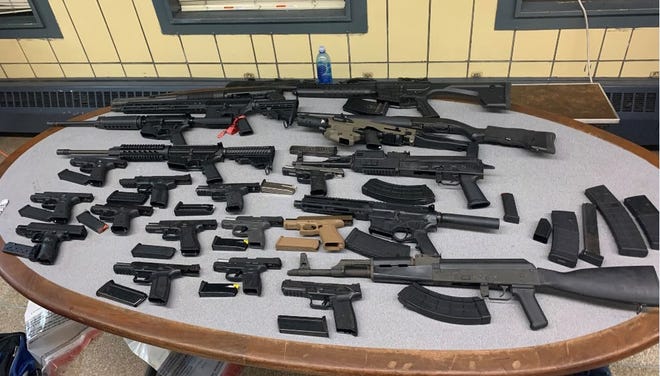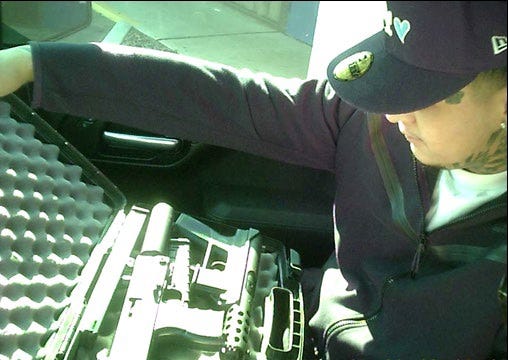DOJ's gun control effort showing progress on straw purchases, gun trafficking
President Biden signed the Bipartisan Safer Communities Act last summer, making it a federal crime to traffic in firearms and stiffening penalties for “straw purchases” made on behalf of people who aren’t allowed to own guns.
Since then, new data from federal prosecutors shows they’ve charged 31 people in 17 cases under the new legislation.
Bureau of Alcohol, Tobacco, Firearms and Explosives spokeswoman Carolyn Collins called the laws “powerful new tools.”
More:ATF director Dettelbach defends stabilizing brace rule, more at congressional hearing
More:With ban on AR-15s and other rifles, Washington joins these states in prohibiting assault weapons

The changes to the federal Gun Control Act “are designed to enhance ATF’s ability to identify, deter, and investigate those who illegally divert firearms from lawful commerce,” Collins wrote in an email.
The first case prosecuted with the new laws was against Said Hernandez, 26 in Laredo, Texas. He began his seven-year prison term for gun trafficking this week after being arrested last summer.
Police intercepted Hernandez traveling south on Interstate 35 towards the Mexican border with 17 firearms. Charging documents show since 2020 he purchased 231 handguns in Texas in calibers of 9mm, .380 and .22 and trafficked them to Mexico.
In public announcements, the ATF warns that straw purchasing can now carry a 25-year prison sentence if the gun is used in a terrorism attack or drug trafficking. In cases reviewed by USA TODAY, defendants often plead down their charges from trafficking or straw purchasing to lesser offenses.
What is a straw purchase?
In general, straw purchasing is when the buyer of a firearm is actually buying a gun on behalf of someone else. New laws further say it’s illegal to buy for someone who is prohibited under federal law, intends to use the gun in furtherance of a felony or drug trafficking or intends to sell or dispose of the firearm to another prohibited person. More:First federal gun crime report in 20 years shows shrinking time between firearm pMore:How guns are smuggled from state to state on the iron pipeline
Confidential informants, Instagram posts lead to charges
Earlier this year, federal agents in Las Vegas kept a watch on Adrian Quebec, 21, after he publicly posted on his Instagram account stories about the sales of several firearms.urchase, usage in crimes
What is illegal gun trafficking?
In general, gun trafficking is diversion of guns from lawful commerce into the illegal market. The new legislation defines gun trafficking under a stand-alone statute that makes it illegal to “ship, transport, transfer, cause to be transported, or otherwise dispose of any firearm to another person in or otherwise affecting interstate or foreign commerce, if such person knows or has reasonable cause to believe that the use, carrying, or possession of a firearm by the recipient would constitute a felony.”
Agents used confidential informants to perform controlled buys of at least seven firearms — including those ATF considers unserialized, privately made firearms. A criminal complaint alleges Quebec drew attention for selling handguns affixed with what the ATF describes as “machine gun conversion devices” or “Glock switches,” which bypass the semi-automatic functions of a pistol to fire automatically.

In November, Quebec posted on Instagram a link to a news story about police concerned about the Glock switches and appeared to taunt the government to “come get” them. He was arrested several weeks later.
Quebec entered a plea agreement this month for three years in prison. A final sentencing is set for July. Quebec’s public defender declined to comment on the case.
Straw purchasing tied to attempted murder case
Prosecutors charged Sameka Buxton, 31, the girlfriend of Tyrin Wiltz, 28, in New Orleans with straw purchases of five firearms.
Wilks has been charged with second-degree attempted murder of Joe Cooper, the husband of a well-known radio DJ. Cooper was critically injured in the home-invasion shooting, which happened in May 2022.
The FBI, local police and U.S. Marshals attempted to arrest Wilks in September at his apartment. He barricaded himself, Buxton and two children in the home for nearly three hours.
More:Their guns fueled Chicago crime. When they broke the law, the ATF went easy.
Wiltz eventually surrendered, and police located disassembled firearms they said were purchased by Buxton, drugs and more than $134,000 in cash.
Buxton entered a plea agreement and is facing up to six years in prison at sentencing in June.
DOJ says BSCA having impact elsewhere
Peter Carr, a spokesman for the Department of Justice, said gun trafficking cases are resource-intensive.
“By their nature, firearm-trafficking cases often involve multiple defendants whose criminal conduct crosses jurisdictional lines,” Carr wrote in an email. “These prosecutions require not only time, training, and resources but also cooperation among different U.S. Attorneys’ Offices and numerous state and local law-enforcement partners.”
More:After repeated ATF warnings, gun dealers can count on the agency to back off; sometimes firearms flow to criminals
More:'Rogue' gun dealers revealed: What to know as ATF names gun shops that flout federal laws
In addition to the trafficking and straw purchasing provisions, Carr said the new law signed last year mandated enhanced background checks for buyers under 21. Those denials have blocked more than 130 firearm purchases since November.
Nick Penzenstadler is a reporter on the USA TODAY investigations team. Contact
No comments: